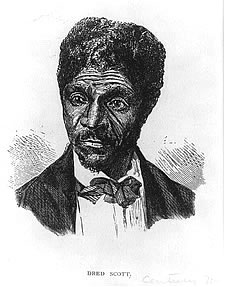From BlackPast:
 This is certainly a very serious question, and one that now for the first time has been brought for decision before this court. But it is brought here by those who have a right to bring it, and it is our duty to meet it and decide it. The question is simply this: Can a negro, whose ancestors were imported into this country, and sold as slaves, become a member of the political community formed and brought into existence by the Constitution of the United States, and as such become entitled to all the rights, and privileges, and immunities, guarantied by that instrument to the citizen? One of which rights is the privilege of suing in a court of the United States in the cases specified in the Constitution.
This is certainly a very serious question, and one that now for the first time has been brought for decision before this court. But it is brought here by those who have a right to bring it, and it is our duty to meet it and decide it. The question is simply this: Can a negro, whose ancestors were imported into this country, and sold as slaves, become a member of the political community formed and brought into existence by the Constitution of the United States, and as such become entitled to all the rights, and privileges, and immunities, guarantied by that instrument to the citizen? One of which rights is the privilege of suing in a court of the United States in the cases specified in the Constitution.
… It may be safely assumed that citizens of the United States who migrate to a Territory belonging to the people of the United States, cannot be ruled as mere colonists, dependent upon the will of the General Government, and to be governed by any laws it may think proper to impose. The principle upon which our Governments rest, and upon which alone they continue to exist, is the union of States, sovereign and independent within their own limits in [60 U.S. 393, 448] their internal and domestic concerns, and bound together as one people by a General Government, possessing certain enumerated and restricted powers, delegated to it by the people of the several States, and exercising supreme authority within the scope of the powers granted to it, throughout the dominion of the United States. A power, therefore, in the General Government to obtain and hold colonies and dependent territories, over which they might legislate without restriction, would be inconsistent with its own existence in its present form. Whatever it acquires, it acquires for the benefit of the people of the several States who created it. It is their trustee acting for them, and charged with the duty of promoting the interests of the whole people of the Union in the exercise of the powers specifically granted….
But the power of Congress over the person or property of a citizen can never be a mere discretionary power under our Constitution and form of Government. The powers of the Government and the rights and privileges of the citizen are regulated and plainly defined by the Constitution itself. And when the Territory becomes a part of the United States, the Federal Government enters into possession in the character impressed upon it by those who created it. It enters upon it with its powers over the citizen strictly defined, and limited by the Constitution, from which it derives its own existence, and by virtue of which alone it continues to exist and act as a Government and sovereignty….
Upon these considerations, it is the opinion of the court that the act of Congress which prohibited a citizen from holding and owning property of this kind in the territory of the United States north of the line therein mentioned, is not warranted by the Constitution, and is therefore void; and that neither Dred Scott himself, nor any of his family, were made free by being carried into this territory; even if they had been carried there by the owner, with the intention of becoming a permanent resident.
More here. (Note: At leas t one daily post throughout February will be devoted to African American History Month)
“UN: Drones killed more Afghan civilians in 2012,” says the Associated Press headline. The article begins: “The number of U.S. drone strikes in Afghanistan jumped 72 percent in 2012, killing at least 16 civilians in a sharp increase from the previous year.” The message seems clear: More Afghans are dying, because drones kill civilians.
